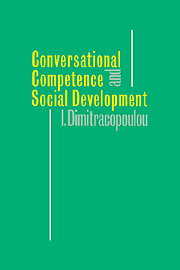Book contents
- Frontmatter
- Contents
- List of figures
- List of tables
- Acknowledgments
- 1 Introducing pragmatics
- 2 Toward an elaborated model of language: speech-act theory and conversational analysis
- 3 Language use and social functioning
- 4 Methods of research
- 5 Evidence on language use
- 6 Interdependence of social cognition and communication
- 7 Implications and applications
- Appendix 1
- Appendix 2
- Notes
- References
- Author index
- Subject index
7 - Implications and applications
Published online by Cambridge University Press: 25 March 2010
- Frontmatter
- Contents
- List of figures
- List of tables
- Acknowledgments
- 1 Introducing pragmatics
- 2 Toward an elaborated model of language: speech-act theory and conversational analysis
- 3 Language use and social functioning
- 4 Methods of research
- 5 Evidence on language use
- 6 Interdependence of social cognition and communication
- 7 Implications and applications
- Appendix 1
- Appendix 2
- Notes
- References
- Author index
- Subject index
Summary
The chapter begins with a brief summary of the results of my study of child language development. This includes both a discussion of the evidence and the particular advantages of the pragmatic approach I have adopted. Following this summary, there is a discussion of the ramifications of the empirical investigation for philosophical models of language. The chapter closes with an examination of how the insights provided by my research might be usefully applied in practical attempts to facilitate language learning.
Summary of findings
The study reported here examines how children learn to use language in interaction with their mother. The aim of the study was to provide new insight into the development of the child's ability to become a competent participant in conversation. It thus followed recent efforts to apply the pragmatic philosophy of language to the psychology of language development. Adopting this perspective, linguistic communication was not viewed simply in terms of the specifics of what was said, but also with regard to the part it played in the individuals' attempts to act effectively in a structured social environment. This led to a study of language which focused not so much on its semantic content or syntactic form, but rather on the various ways that language can be used in social interaction.
- Type
- Chapter
- Information
- Conversational Competence and Social Development , pp. 128 - 142Publisher: Cambridge University PressPrint publication year: 1990



